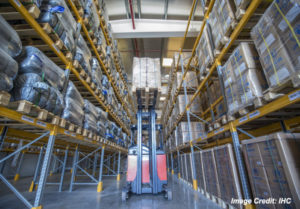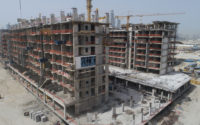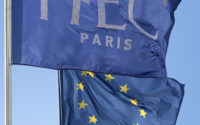International Humanitarian City: World’s Largest And Most Efficient Global Humanitarian Logistics Hub
The International Humanitarian City, IHC, in Dubai was one of the focal points today on the programme of the three-day visit to the UAE by HRH Prince Charles, the Prince of Wales, and his wife, HRH the Duchess of Cornwall. The city has grown in little more than a decade to become the world’s largest and most efficient global logistics hub for humanitarian activities, hosting nine UN agencies as member organisations, and over 55 NGOs and commercial entities listed.
IHC members have more than 300 staff and 93,000 square metres of warehousing.
A non-profit, independent free-zone authority, IHC is mandated to facilitate international humanitarian aid. Its purpose is to reach victims of crises and alleviate the suffering of those who are scarred by hunger and poverty.
IHC was originally established in 2003 by the UAE Vice President and Prime Minister and Ruler of Dubai, His Highness Sheikh Mohammed bin Rashid Al Maktoum. It originally consisted of two cities, Humanitarian City being the hub of non-profit humanitarian organisations, and Aid City which was geared towards the delivery of international aid from Dubai.
A plan to merge the two cities was developed in 2005, and in 2007 H.H. Sheikh Mohammed issued a decree establishing IHC as a Free Zone Authority, with HRH Princess Haya bint Al Hussein as its chairperson.
A plan was also launched to move it to a new location in Dubai Industrial City, only 18km from the new Al Maktoum Airport and 21km from Jebel Ali Port, enabling members to move shipments from sea to air in as little as 10 minutes. The relocation was completed by 2011, allowing the various UN agencies, non-governmental agencies and commercial members’ emergency response operations to be increased.
A new law issued in 2012 defined the key objectives of IHC as being encouraging and developing humanitarian services, ensuring quick and effective response in case of disasters and emergency situations and establishing Dubai as a hub for providing humanitarian aid in emergency situations and for disaster relief, among others.
Last year, the roadmap for 2015-2021 strategy was launched by H.H. Sheikh Mohammed and IHC became a member of the Mohammed bin Rashid Al Maktoum Global Initiatives, the largest development foundation in the Middle East. The IHC also benefits from the policy guidance of an international group, the H10, convened by H.H. Sheikh Mohammed, which includes heads of UN agencies and some of the world’s greatest experts on humanitarian aid.
The IHC can reach two-thirds of the world’s population within eight hours. It does everything possible to get aid, including food, medical supplies, blankets, tents and water purifiers, to those who need it following natural disasters and other tragic events around the world.
As well as the physical, practical aid it helps deliver around the world, it is committed to giving organisations the tools and training they need to better serve their people.
The IHC is more than logistics and deliveries, it helps coordinate agency and NGO responses in crises, provides state of the art training and conference facilities, and has hosted the launch of UN appeals for emergency aid. It has also become a valued refuge for aid workers during crises and offers a high level of security both for workers and donor goods.
Emergency response activities co-ordinated from the IHC over the last few years have included countries in the South Pacific, Asia, the Middle East, Africa, Southern Europe and the Caribbean.
Between 2011 and 2015, emergency response shipments handled by organisations within the IHC were worth over US$527 million, or AED1.94 billion.
For more information, visit ihc.ae








 Email: info@cyber-gear.com
Email: info@cyber-gear.com